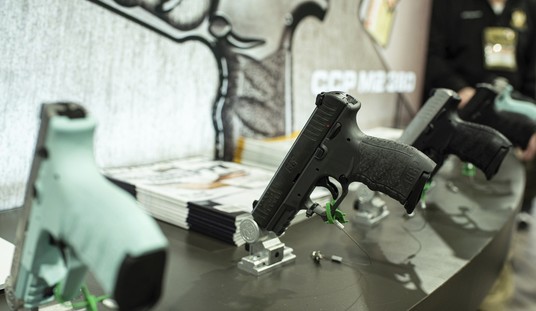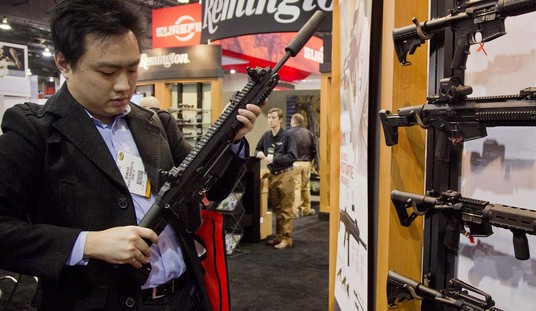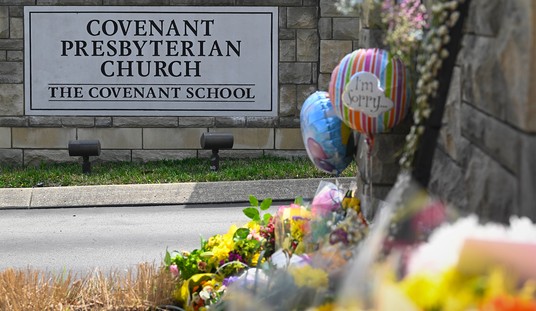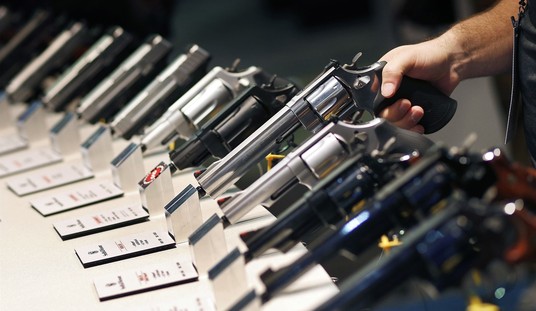In an exclusive interview with Guns & Patriots, the author of “Patton: Blood, Guts and Prayer,” talked about his new book, which examines General George S. Patton Jr.’s leadership, warrior ethos and lifetime of Christian devotion.
“For this guy, faith was part of his being,” said Michael Keane, a fellow of national security at the Los Angeles-based Pacific Council on International Policy.
If you ignore Patton’s Christianity, then you cannot understand how he approached challenges or how he achieved his successes, or how he shaped history, Keane said.
“He was raised reading the Bible, praying every day,” he said.
“His faith in God and his faith in himself became this core,” he said.

“You can’t find a page or entry in his diary with him not giving thanks to God or asking for God’s help when he is being challenged or writing a prayer himself—it is amazing how intense his personal devotion is,” he said.
Patton’s most famous prayer, an incident portrayed in detail in the movie “Patton,” was the one he ordered the Third Army chaplain Msgr. James H. O’Neill to write in early December 1944, as rains were bogging down the army’s progress.
O’Neill wrote a prayer that he assumed was for the general’s private devotion, but Patton ordered it sent to every soldier under his command.
The prayer was printed on cards with Patton’s Christmas greeting on the other side, and it was out to most of the troops by the middle of December—right before the Germans launched the Battle of the Bulge.“The movie is great, obviously, but it tends to see Patton as a bit of a caricature, and the same thing for that prayer,” Keane said.
Keane said he researched the prayer thoroughly to fully understand what it was all about.“It wasn’t just a gimmick to him,” he said.
“What you start to understand is that Patton saw prayer as a force, a force of nature, a force of God, really, not just some words one uttered,” he said.

“He thought that everyone praying together was like a force field, like an X-Ray, you couldn’t see it, but it could shape and affect things, with a power unto itself,” he said.
“That’s why he had the whole Third Army pray and issue a directive on prayer because he thought it would help them accomplish their mission,” he said.
The first of two surprises Keane said he learned when he was researching the book was that Patton was much more of an intellectual than he thought.
“Patton was incredibly well-read, probably the most historically well-read officer the Army has ever produced,” said Keane, who was embedded with the 101st Airborne Division during the 2004 liberation of the Iraqi people.
Patton had a reputation for being dim because he was held back at West Point, he said. “That was really because of his dyslexia, he was actually a brilliant guy.”
There is a joke at West Point about the statue of Patton in front of the library, because it was a building he never stepped foot in, he said.
Throughout Patton’s diaries, he mentioned seeking out and meeting professors, historians and at each entry Patton would describe how he bested them with his knowledge and understanding of history, he said.
The second surprise was that Patton was incredibly sensitive dealing with people, he said.
“When he wanted to be, he could be very diplomatic,” he said.
“You see this in the North Africa campaign, where he spoke French, in how he dealt with the Vichy and especially the Arabs and the Berbers—they absolutely adored Patton,” he said.

To the local nationals in North Africa, Patton presented himself as a man who had read the Koran and enjoyed speaking about Islam, he said. “He was this American pro-consul in who it was stunning how sensitive he was to the locals.”
“Patton and Eisenhower had been close personally and professionally for many, many years, throughout their careers that friendship was fairly breached by the end of World War II,” he said.
During the war, Patton upset more than a few people in the Army hierarchy, including Eisenhower’s chief of staff Gen. Walter Bedell Smith, he said. The relationships had become so toxic that Patton gave instructions that Eisenhower, Smith and others were not invited to his funeral.
“What is fascinating to me is how distinct they are from each other,” he said.
“A lot of outsiders look at the military, the Pentagon and the Army, they think of it as a very unified, one-team-place, it is not,” he said.
“It is comprised of a lot of different competing tribes within the Army itself,” he said.
“Each general comes from a different tribe within the Army,” he said. “They come with that persona, the culture, the leadership style of their organization—and those organizations within the Army compete with one another for resources and leadership positions—there is a lot of competition and jockeying.”
Patton was part of that tumult, he said.
“Patton is so iconic, and such an entity unto himself, everyone is different from Patton,” he said.
“I don’t think you’ll ever find someone like Patton again,” he said.
“In today’s military, I don’t think a Patton could exist anymore,” he said.
“If you look at the archetype for military leaders, there is definitely a tendency to have no personality, towards less bold leadership, they are now taught throughout their careers to be more reserved, more political, more diplomatic,” he said.
“Patton’s favorite saying: l’audace, l’audace, l’audace —you know, the French word for audacity, that is not going to happen any more,” he said.
In his career, Patton had at least six public relations disasters equal to the single incident that cost Army Gen. Stanley A. McChrystal his career, he said. “The stunning thing about it is that if you read the ‘Rolling Stone’ article that got McCrystal fired, there are only three direct quotes from McCrystal in it and none of them are incendiary at all.”
McChrystal was punished for things others said, and even those things were as much trouble as the type of thing that Patton would say routinely, he said.
In the 1940s, it was much more shocking to hear profanity than it is today, he said.
Patton’s chaplain O’Neill always defended the general’s use of language because the monsignor recognized that is was all part of fighting the war and ending it as quickly as possible, Keane said.
“The unforgiving nature of that part of it is partially attributable to the media cycle that we live in,” he said. “It took months for Patton’s slapping of a soldier to get reported, whereas with McChrystal, once that hit the internet, he didn’t have a chance to respond, he was put on a plane flying home to meet with the president, and then he is fired.”
Keane said it happened so fast that there was no chance for reflection.








Join the conversation as a VIP Member